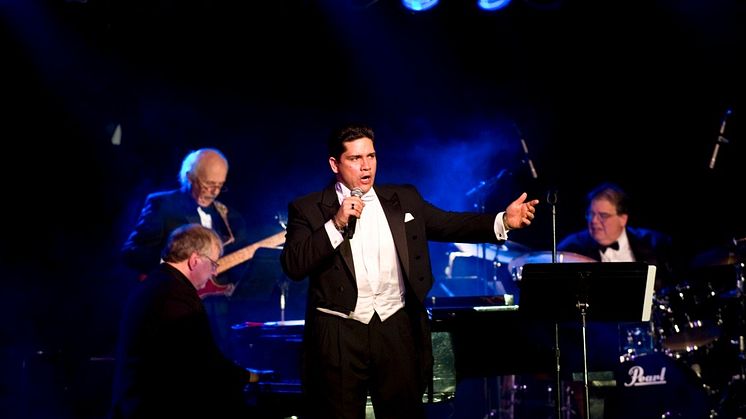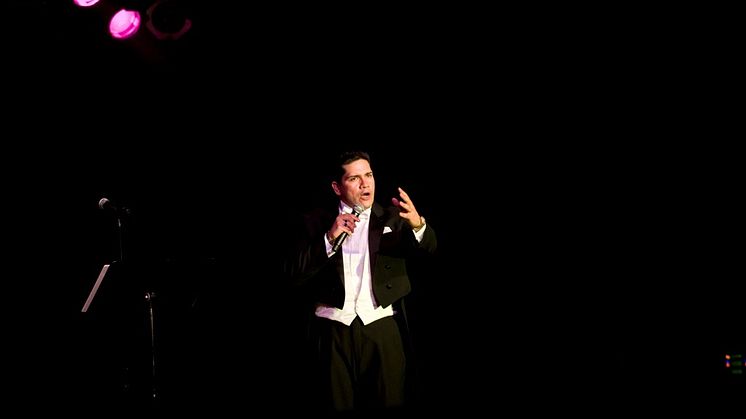
Blog post -
Aaron Caruso: An Italian-American Man of Taste, Tenacity, and Talent
Article by Mary Kovach Ph.D.
Aaron Caruso turned his passion to sing obscure Italian music into a thriving career. From the grandest stages around the world, he captivates audiences with his powerful high C and genuine likability.
Schooled by Maestro Luigi Veccia, whose training in Italy was rooted in the true Bel Canto style, Caruso mastered this centuries-old Italian manner of singing. Caruso continues to perform around the world, and manages a small voice studio of select apprentices to pass on the knowledge he accrued from his 25 years of musical training and stage experience.
In this interview, you will feel Caruso’s enthusiasm for song and understand how he capitalized on both his unmatched dedication to the art and skillful talent to realize his dreams.
Kovach: What made you fall in love with Neapolitan music, sometimes simply known as the music of Naples?
Caruso: Well, it probably started with hearing The Three Tenors singing these great melodies back in 1990, at what is now their infamous concert at Caracalla, in Rome. The audience obviously loved their operatic arias, but as soon as they heard the first few strains of the Neapolitan music, such as “O Sole Mio,” for example, they would roar with delight. I always took note of that whenever I saw them in person. It was as if the Neapolitan music was a great treat for the artists to give us.
I know that even the legendary tenor Enrico Caruso is said to have sung Neapolitan songs as encores on the stage of the Metropolitan Opera. It’s always been that way at concerts. Let’s get the work done before we can really enjoy ourselves.
Once I started singing these Neapolitan songs, I soon realized they are just beautiful melodies and very difficult to sing. They require the same amount of skill that it would take one to sing an operatic aria or an extremely challenging art song.
Kovach: Singing Neapolitan music is unique. How do you introduce it to your audiences in the U.S.?
Caruso: Well it’s not as unique as one would think! I’m sure your audience has heard the song “It’s Now or Never,” sung by Elvis Presley. In addition to becoming his most popular selling 45-rpm record of all time, it was actually a Neapolitan song that was sung in English. He was a huge fan of Mario Lanza. When Lanza passed, Elvis wrote the song in English, and the rest is history.
Many Italian American crooners including Dean Martin, Perry Como, Jerry Vale, Vic Damone, and even Frank Sinatra have sung Neapolitan songs in their repertoire. They would sing half in English and half in Neapolitan—which is a language, by the way. Songs like “O Marenariello” became, “I Have But One Heart,” then the song “Dicitencello Vuie“ became the song “Just Say I Love Her,” and, so on….
Kovach: How did you come to the realization you could turn your passion into a career?
Caruso: When I realized how much this style of music is loved by Italians and Italian- Americans, it was truly an eye-opener. When we speak of Italian culture in terms of what we can pass on to the next generation, we generally only think of food and language. We tend to forget that the missing piece of that puzzle, which is as equally important—the music.
The Italians have a songbook, just like we have an American songbook. Our ancestors who mostly came over here on steamships were singing those songs when they made that risky voyage. There is a body of songs that most all Italians know from the top of Italy all the way down to the bottom of Sicily. Among those songs, a lot of them are Neapolitan. I don’t only love the Neapolitan songs, but there is much more to sink your teeth into, if you will.
Many people erroneously think these are folk songs, which they are not. Folk music by definition is anonymous. These songs were written by accomplished composers and poets. Salvatore Di Giacomo, for example, is one of Italy’s great poets. One could make the argument that if he had written in a major language other than Neapolitan, he would have been a Nobel laureate in literature.
There are many layers of artistry in every song that still engage me, 30 years after I began listening to this. Once I established myself as a younger guy singing this older music, I became an anomaly around the country because there weren’t many artists doing this. I followed two old business adages: “Go where they ain’t,” and, “Do what you love!”
Kovach: It’s remarkable how you honor your heritage and continue to share it through song. How has the Neapolitan culture inspired your career?
Caruso: Neapolitan song is included in every single one of my concerts, so there is a great deal of gratitude there. Being an Italian-American of Sicilian origin, I had to study Neapolitan as a language to get the correct pronunciation, to do the songs justice. I’m still studying, of course, but I was given a great compliment by a colleague in Sorrento when he said, “But you’re half Neapolitan,” (Ma tu si miezz Napulitan!) after singing “Core‘Ngrato.”
The more I learn about the Neapolitan culture, the more impressed I am. Do you know the Bourbon King spoke Neapolitan? It was the language of the court. I wish the Italian-Americans realized that although they may speak Sicilian or Neapolitan, or some form of either, these are real languages and not just poor, bastardized dialects that aren’t even written down. UNESCO finally declared them both languages a few years ago, but they were always languages. They also have the benefit of being literary languages. And we, as singers, have the benefit of singing them!
Kovach: Your extensive knowledge of music, specifically Neapolitan, is quite impressive. To what depth have you specifically studied it?
Caruso: I mainly studied it by listening over and over to different types of voices singing the same songs. For example, one can listen to “Corengrato,” by Enrico Caruso and then Sergio Bruni two completely different interpretations, styles, and voices. Both of them were from Napoli, so they pronounced words the same. Many singers who— are not natives would do well to study those who are from there and have left this great treasure of recordings for all to enjoy. I also studied and coached with Professor Marcarelli in New Haven, Connecticut who is an expert on Neapolitan language, song, and interpretation.
Kovach: You are preparing for an upcoming album. Will it include a Neapolitan inspiration?
Caruso: Yes, it will! I have some great classic Neapolitan songs on there that aren’t as well-known, but they are just as beautiful! There is also an original Neapolitan song written by my dear friend, Ralph Marcarelli, called “Malincunia.” It will be a lifelong dream come true, to shine a light on these forgotten treasures.
Aaron Caruso is a true entertainer who is devoted to his craft. He is also an exemplary Italian-American.
Dr. Mary Kovach is an associate professor who teaches business management courses. Find management-related videos on her YouTube channel: Dr. K – The Management Professor.

